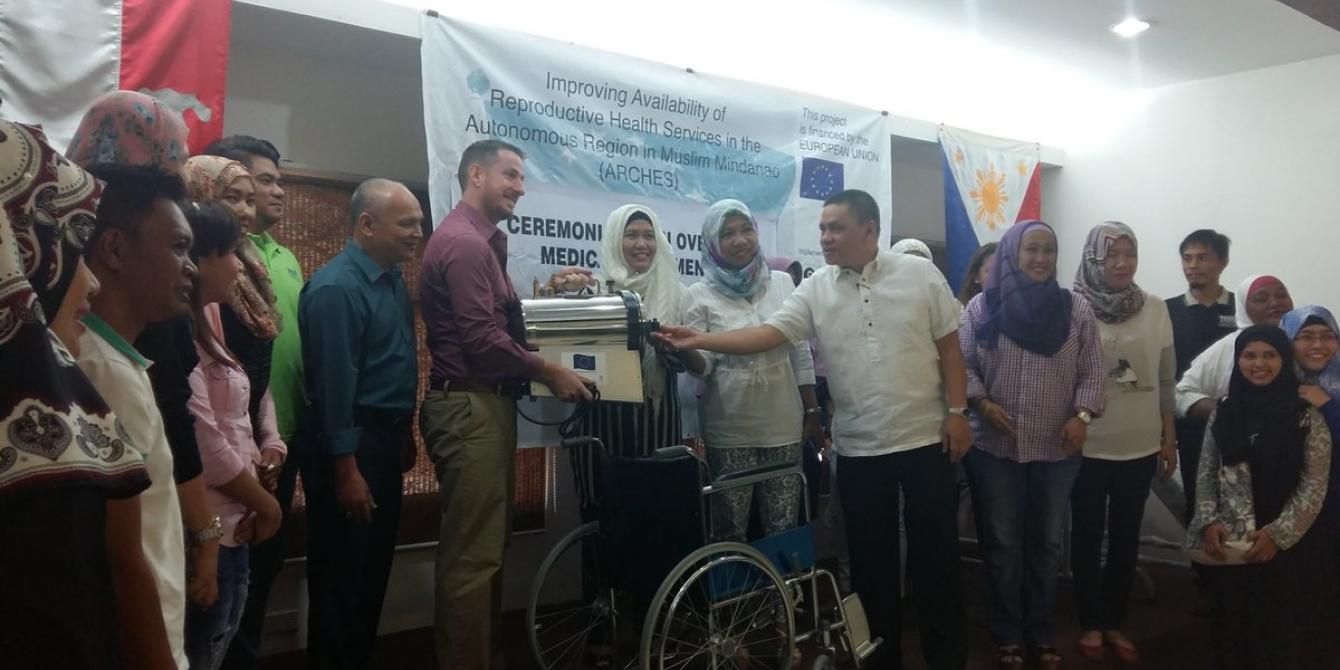Oxfam, EU deliver PhP4-million worth of medical aid to Muslim Mindanao

Cotabato City, Philippines –The Bangsamoro region should no longer fall behind in terms of support to women’s sexual and reproductive health (SRH) services . The Regional Government of the Autonomous Region of Muslim Mindanao (ARMM) underlined this call as they led the turnover of medical equipment from international aid agency Oxfam, and the European Union, to local governments of Maguindanao, Lanao del Sur, Basilan, Sulu and Tawi-Tawi.
ARMM Governor Mujiv Hataman joined Oxfam and EU, as well as partner organizations Al Mujadilah Foundation (AMDF), United Youth of the Philippines-Women (UnYPhil-Women), Tarbilang Foundation Inc. (TFI), Pinay Kilos (PinK!), Philippine Legislators' Committee on Population and Development Foundation (PLCPD), and Philippine Business for Social Progress (PBSP) as they turned over PhP4-million worth of medical equipment that will improve the delivery of sexual reproductive health (SRH) services to 14 cities / municipalities in the region, which includes Mamasapano (Maguindanao), South Ubian (Tawitawi) and Panglima Tahil (Sulu) among others. Some of the items turned over included fetal dopplers, oxygen tanks, wheel chairs, examination tables, delivery tables, and pediatric stethoscopes, among others.
“We believe in the importance of protecting the rights and welfare not only of women but also the families they raise and support, and we recognize that there is a need to ensure that reproductive health services are made available for all, especially for the disadvantaged,” said Hataman.
The donation of medical equipment, meant to help build the capacity of local governments to deliver SRH services, was made possible through the project Improving Availability of Reproductive Health Services in ARMM or ARCHES. ARCHES is a five-year development project of Oxfam, funded by the European Union, that aims to protect the rights of women and girls, and address the gaps in the delivery of reproductive health services in the region. It is being implemented through a partnership with national and local civil society organizations.
Government figures showed that ARMM has one of the highest poverty incidences among families at 54% compared to 25% in the country[i]. Based on the 2013 National Demographic and Health Survey, married women in ARMM have the highest unmet need for family planning at 28%, double the NCR’s. In ARMM, one out of 10 births was delivered by a skilled professional, whereas in NCR, it was nine out 10. Delivery in a health facility was less than one-sixth of NCR’s.
“The ARMM is not just among the poorest regions in the country, it is also lagging behind in terms of reproductive health. We are grateful for the support and the cooperation of the local government to this project, we hope we can finally make reproductive health happen in the region,” said ARCHES project manager Lizel Mones.
Deep-seated cultural norms and misconceptions that deter women and men from using contraception, and the long-standing armed conflict situation in most areas in ARMM, have largely driven the underinvestment and lack of promotion of SRH services.
“I have had 10 deliveries, but only six babies survived. The health facility (Rural Health Unit) nearest to our barangay is 20 kilometers away, equivalent to a two-hour trek,” shared Mylin Lawan, a 30 year old mother who comes from the Teduray indigenous community in Guindulungan, Maguindanao. “I don’t want to experience that again, it’s painful.”
Lawan was one among those who participated in ARCHES’ sexual and reproductive health orientation and counselling seminars. She recently availed of the subdermal contraceptive implant, or implanon, a kind of contraception that is embedded under the skin, which can last up to three years.
“It’s hard to raise many children, because my husband’s income is not enough. So I decided to have this implant because it’s convenient. It’s effective and it has no side effects,” said Lawan. She says that she’s glad that women like her can now avail and benefit from this service, something that she never understood before.
Oxfam Country Director Justin Morgan said that , key to the success of the project is its ability to work closely with national, regional, and local governments, health officials, religious leaders, and institutions that influence mindsets and public opinion, such as schools and the media, women’s rights organizations, and other civil society groups.
“It has been less than a year since ARCHES was launched, and we have already seen how the lives of the women changed, especially those who have come from poor farming communities in Muslim Mindanao ,” said Morgan. “The new Administration under President Duterte has promised to fully implement the Reproductive Health Law, and hence we look forward to more women benefiting from these types of services, especially in areas where women have very limited access to reproductive health facilities and services.”
ARCHES is a joint undertaking between Oxfam,PLCPD, PBSP and four women’s rights organizations (WROs) who have long been working with local communities in ARMM, namely: Al Mujadilah Development Foundation, Inc. (AMDF), for the province of Lanao del Sur; Pinay Kilos (PinK), for Sulu and Basilan; Tarbilang Foundation, Inc. (TFI), for Tawi-Tawi; and United Youth of the Philippines-Women (UNYPHIL Women), for Maguindanao. The project is being funded by the European Union (EU).
[i] http://www.nscb.gov.ph/ru8/NewsClip/2015/20150309_bw_poor.pdf
For more information, please contact:
Rhea Catada
Mobile: 0928 5042911; 0917 365 4649
Email: rcatada@oxfam.org.uk, rhea.catada@gmail.com
Oxfam in the Philippines

 Follow us on Facebook
Follow us on Facebook Instagram
Instagram Follow us on Twitter
Follow us on Twitter LinkedIn
LinkedIn